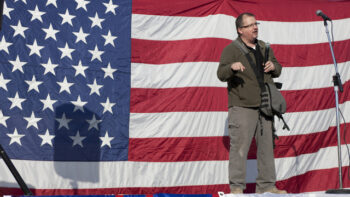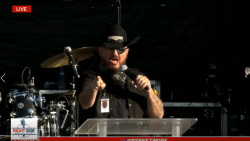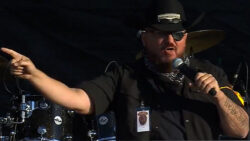
Before investigators and journalists even began to reconstruct the events of Jan. 6, 2021, the presence of Oath Keepers loomed large. A belligerent organization comprising active and retired law enforcement officers and members of the military, Oath Keepers members pledge to not enforce any order that they themselves deem to be unconstitutional. At one of the rallies that formed the drumbeat in the ramp-up to the Capitol insurrection, Oath Keepers founder Stewart Rhodes demanded that Donald Trump declare martial law and deputize Julian Assange to do an infodump—and that if the then-president failed to do so, Oath Keepers would have to take matters into their own hands in what he promised would be “a much more bloody war.”
At present, 12 members of Oath Keepers have been charged by federal prosecutors in a conspiracy case regarding their alleged roles in the violent overtaking of the Capitol that January day.
The siege of the U.S. Capitol was, you might say, more than a decade in the making. Eleven years and one day ago, I attended a press conference convened by Oath Keepers on the eve of a Second Amendment rally scheduled to take place in Washington, D.C. Founded on a timeline adjacent to that of the Tea Party movement, Rhodes went to great lengths to declare that his armed and clearly anti-government organization was different from militia groups; he took particular umbrage at being lumped together with the Hutaree militia, a violent Christian nationalist group that was infiltrated by the FBI that year.
It’s notable that in 2010, just as did some involved with efforts to overturn the 2020 election, Rhodes invoked the language of the American Revolution, declaring the April 19, 2010, gun march to be held in commemoration of the Battle of Lexington and Concord. And it’s clear from this decade-old interview that Rhodes identified closely with the Tea Party movement—a movement created in backlash to the election of the nation’s first Black president. At that time, he all but swore to me that his group was against the overthrow of the government. In the intervening years, he seems to have changed his tune, perhaps buying into debunked conspiracy theories about he conduct of the election that resulted in the defeat of his favored candidate, then-President Donald J. Trump.
During the Capitol insurrection, Rhodes cleverly remained outside the building, even as Oath Keepers members broke in amid a mob of Trump supporters in an attempt to prevent the certification of the 2020 Electoral College votes. However, Rhodes maintained contact with some of the insurrectionists as they took part in the mayhem in the marble halls of government. Now, with the April 16 guilty plea of Oath Keepers co-founder Jon Ryan Schaffer, prosecutors seem to have Rhodes in their sights; Schaffer has promised to cooperate with Justice Department investigators. Initially charged with six crimes, Schaffer was permitted to plead guilty to two in exchange for the promise of cooperation. According to the Washington Post, Schaffer’s plea is as follows:
Schaffer pleaded guilty to only two charges, but both are felony offenses carrying serious penalties that federal prosecutors are relying on heavily in the wider probe. One, obstruction of an official proceeding of Congress, is punishable by up to 20 years in prison; the other, trespassing on restricted grounds of the Capitol while armed with a deadly or dangerous weapon, carries up to a 10 year prison term.
…
Under terms of the plea deal signed by Schaffer and his attorney, Marc Victor, he faces a recommended prison term of 41 to 51 months under nonbinding federal guidelines, though his sentence will ultimately be decided by a judge.
The article below originally appeared at AlterNet.
* * *
April 18, 2010–If I understood Stewart Rhodes, founder of Oath Keepers, correctly, then MSNBC, Mother Jones, the Southern Poverty Law Center and perhaps even AlterNet are in league with the U.S. government as part of a secret program designed to discredit his group. But perhaps I misunderstood. By his own telling, Stewart Rhodes is frequently misunderstood.
Founded on the heels of the 912 Tea Party march on Washington, Oath Keepers is a group representing law enforcement officers and members of the active and retired military who pledge not to enforce any order or law they believe to contradict the U.S. Constitution. Listed first among the “orders we will not obey” on the group’s website is: “We will NOT obey orders to disarm the American people.” At today’s Second Amendment March on Washington — a rally of gun-rights advocates at the Washington Monument—Rhodes will conduct an “Oath Keepers’ ceremony” in which “those who have sworn an oath to uphold the Constitution can renew that oath.”
At a press conference yesterday for the Second Amendment March, Rhodes delivered remarks at the National Sheraton in Arlington, Va., at which he complained of his treatment at the hands of MSNBC’s Rachel Maddow, as well as Justine Sharrock, who penned Mother Jones’ recent cover story on Oath Keepers, and who also writes for AlterNet. He said he was thinking about suing Mother Jones for libel because she chose to profile in her story an Oath Keepers fan who is preparing for war against the government, rather than the active-duty naval commander who sat on the organization’s board at the time Sharrock was reporting her article.
Later, when Rhodes sat down with me for an interview of which he ultimately decided I was unworthy, he threatened to sue AlterNet for running an article by the Southern Poverty Law Center‘s Mark Potok that labeled Oath Keepers as “a Patriot outfit formed last year that suggests, in thinly veiled language, that the government has secret plans to declare martial law and intern patriotic Americans in concentration camps,” and that listed the organization among a range of right-wing extremist groups that includes white supremacist organizations.
Rhodes, it soon became clear, feels aggrievedly misrepresented, and perhaps he is. But he does make common cause with people of extreme views, and his rhetoric sometimes reads like a dog whistle to a paranoid element that periodically arises in America to devastating consequences, as in the case of the Oklahoma City bombing that took place 15 years ago today.
But that has nothing to do with the choice of April 19 for the Second Amendment march, Rhodes said. Today marks the 235th anniversary of “the shot heard around the world”—when fire was first exchanged between British troops and American revolutionary militiamen at Lexington and Concord; that’s the point of April 19, he said. He was annoyed to no end that Rachel Maddow, in particular, kept linking the date to the Oklahoma City bombing, even if she did mention Lexington and Concord. And Homeland Security Secretary Janet Napolitano had no business going to Oklahoma City today to mark the anniversary, he said; she belonged on the Lexington Green.
Often lumped in with militia groups by media and watchdog organizations, Oath Keepers is actually a breed unto itself, boldly proclaiming on its website that the group does not advocate or promote the overthrow of the U.S. government, nor, the website says, is the group “advocating or promoting violence towards any organization, group or person.” However, it adds, “We are determined to Keep our Oath to support and defend the Constitution.”
Yet the website offers more than a whiff of paranoia. Scroll down the list of “Orders We Will Not Obey” on the Oath Keepers’ site, and you find promises not to obey orders to herd American citizens into detention camps, or to confiscate the property or food of the American people. Number 5 on the list reads, “We will NOT obey orders to invade and subjugate any state that asserts its sovereignty.”
While Oath Keepers may not “advocate” or “promote” violence, Rhodes is sketchy on his relationship with those who do. Running concurrently with today’s Washington, D.C., gun-rights rally is one just across the river in Virginia—where the gun laws allow for participants to be armed—called “Restore the Constitution” at which militia-affiliated activists are scheduled to speak, and in which Oath Keepers was scheduled to participate until its board pulled the organization out several days ago.
The way Rhodes explained it at the press conference was not that he objected to what those groups were doing, but rather that, given the negative attention his group has been receiving in recent months, he wasn’t eager to give his detractors reasons to “smear” him. “I’m not going to be speaking there, because I’m not going to make it easy for them to paint me as militia, he said. “I’m not going to stand next to a militia leader or a former militia leader and give a speech, because that would be used as something to…incorrectly paint Oath Keepers as something it’s not.”
Yet he seems to want to have it both ways. “I don’t begrudge militias or the Three Percent movement, or anybody else who is so concerned with their liberties that they’re expressing the intent to fight if they have to,” he said. “I think that’s a necessary message for this government to get…What liberty-loving person on this planet wouldn’t fight? The Jews of the Warsaw ghetto fought, and guess what the date was? April 19th.”
During the press conference, Rhodes politely answered my questions, but when I approached him for comment after the press conference concluded, he quickly became combative, and shut down the interview after examining, via his BlackBerry, my coverage of the 911 Tea Party march on Washington.
Throughout his remarks, Rhodes referred to the Southern Poverty Law Center as an organization that was out to smear him, and said that SPLC’s Mark Potok had misrepresented Oath Keepers. He said he saw SPLC’s characterization of Oath Keepers as all of a piece with what he said was a government operation gearing up to discredit his organization.
“And the latest thing that they’re going to do, I hear from an informant within federal law enforcement,” he said, “is a CoInTelPro-style operation to make us look like militia—like the Hutaree, is what we’re told—and that should really come as no surprise: that’s exactly what the Southern Poverty Law Center’s been trying to do, and people like Rachel Maddow and Chris Matthews, and on down the line. This has been a relentless program.” CoInTelPro is shorthand for the FBI’s Conterintelligence Program of the 1960s, in which the bureau infiltrated civil rights organizations and other dissident groups, and used dirty tricks to discredit them, sometimes even planting false stories in the media.
When the press conference concluded, I approached Rhodes to ask what facts Potok had gotten wrong. He put me off until his cameraman was free. He records everything now, he said, especially since the Mother Jones piece. “I call it the Justine Sharrock rule,” he said.
He told me that AlterNet had run some nasty things about him. When asked what, he mentioned the Potok piece. I explained that it was a reprint of a Southern Poverty Law Center report, and he suggested that he might sue both AlterNet and SPLC. I couldn’t tell if he was joking.
We sat down on a small bench, upholstered in pink vinyl, outside the meeting room, the size of it forcing us into each other’s personal space. “Why should I trust you?” he asked me.
“I’m not saying you should trust me,” I replied.
“How do I know you’ll be fair?” he asked.
“You don’t,” I said. “Actually, you don’t. Nobody ever knows if a reporter’s going to be fair.”
He asked if there was something I had written that he could look at. I told him I had never written specifically on the 2nd Amendment movement (although I admittedly have referred to gun enthusiasts and even “gun nuts” in writing about the larger right wing), but that I had covered the Tea Party movement, and was most interested in talking to him about the intersection, if any, between his organization and the Tea Party. (The Oath Keepers Web site says the group will be a co-sponsor of this year’s 912 march.)
“So what have you said about the Tea Party movement?” he asked.
“I’ve said a lot of things about the Tea Party movement,” I replied. “I’ve said that it’s misunderstood…that it was an organic movement that has been in part co-opted by these astroturfers [such as FreedomWorks and Americans for Prosperity]–
“That’s certainly true,” he interjected. He was speaking softly, as the proportions of the bench enforced an otherwise unlikely intimacy.
“–and that I had seen racism, you know, racist signs and stuff, at Tea Party movement [events].”
“Really?” he asked. “I’ve never seen racist—”
“Well, maybe it depends on how you define racism,” he said.
“Tell me what you thought was racist,” he said. “I’m just curious.”
“Oh, the stuff where Obama’s dressed as a witch doctor,” I replied. “And I saw a sign that read, KEN-YA TRUST OBAMA?”
“What does ‘Trust Obama’ have to do with his race?” he asked. I missed that he either didn’t catch or left out the “Ken-ya” part.
“Well, I think that’s part of the subtext—among some people,” I said. “And I never said that it’s among all people.”
“If you have a sign that says ‘Trust Obama’, that means you’re part racist?” he asked.
“No,” I replied, getting a bit exasperated. “‘Ken-ya—K-E-N-Y-A—Trust Obama?'”
“That’s about whether or not he’s an American citizen, right?” he asked.
“Probably,” I said. “But I think a lot of that stems from the fact that he’s not white.”
“That’s what it is?” Rhodes asked. “I don’t think people care whether his white or black. I’m not particularly wrapped up in the birth issue, but I know folks who are, and they’re not racists; they just don’t think he’s an American citizen.”
“Yeah, but I think if he was a white guy whose father was born in a foreign country, it wouldn’t be an issue,” I said.
“Do you express that in your articles, that you think they’re all a bunch of racists?” he asked.
“No, I don’t,” I said, meaning that I didn’t think “they’re all a bunch of racists,” but it didn’t come out that way.
“So you just think that,” he said, smugly. He looked up from where he was sitting at his East Coast vice president, Chauncey Normandin, who was standing, watching the two of us and the cameraman throughout this exercise. “Should I give her this interview?” he asked Normandin.
“I gave you bad advice about the Mother Jones,” Normandin replied.
I laughed. It was all very affable, this sparring.
Normandin explained that it wasn’t just Mother Jones who’d burned them, but CNN, as well. He allowed the cable news channel to videotape the conference Oath Keepers sponsored in October, he said, thinking that since it would be on tape, “then they can’t lie about us.” But, he said, he was wrong. “Every single thing that went on there, and every truth about us that was brought out, was distorted,” he said, “because it didn’t fit the agenda. And that’s just what he’s getting at.”
“I will speak to anyone,” Normandin said. “I’ve been to dozens of tea parties all over Florida. I was at one yesterday morning, before I flew up here. I don’t see racists in the movement. I don’t particularly like Obama’s politics. I don’t care if he’s black or he’s white. They questioned John McCain’s birth because he was born in Panama while his father was in the service…so your argument that they wouldn’t question it if he was white—”
“—Well, that was in response to the madness about Obama’s birth certificate.”
“But that’s the whole thing,” Normandin said, “it’s always some lame excuse when it’s in response to this. I’m not racist at all.”
He told me he was in a motorcycle club with a black Muslim guy who was like a brother. “I’d give me life for him,” he said. “To say that I’m a racist — my great-grandmother was a full-blooded Indian. I’m not a racist.”
The most interesting thing about this exchange? I never suggested that either of these men were racist.
Rhodes went on to complain that a Newsweek reporter talked to him for “about 15 seconds” at the Conservative Political Action Conference last month, and then he found himself quoted in an article about neo-Nazis and other bad actors. “She wasn’t there to learn what makes me tick,” he said.
So, what was it that Potok of the Southern Poverty Law Center got wrong, I asked him.
“Well, first of all, I’m not a racist,” he said.
On reviewing Potok’s writings that mention Oath Keepers, I couldn’t a reference to Rhodes as a racist—only a reference to one of his members, Richard Mack, as “a conspiracy-mongering former sheriff.”
“He never even interviewed me,” Rhodes said. “He never called me up and asked, ‘Why’d you start this organization?…He treated me like a lab rat. He just presumed to know what we’re about. He said, ‘What they’re really about is baseless paranoia…'”
“So, why did you start this organization?” I asked.
“It [was] the actions of the Bush administration, post 9-11, that made me very alarmed that what happened in other countries would happen here, too,” he said. “And you, know, just like Naomi Wolf and other people on the political left, I saw the handwriting on the wall, too—the same steps being taken.”
“And people never give back powers that accrue to them,” I said, speaking of the new administration. It’s an argument I had throughout the campaign with fellow progressives—that it was imperative to get the candidates to agree that they would restore the Constitution to its pre-Bush boundaries once they took office. My concerns were often dismissed.
“Of course not,” Rhodes said. “It’s a one-way ratchet. When the political right’s in power, it gets ratcheted up for these purposes. And then when the Democrats come in, they don’t really knock it back down that much. They just change the rhetoric and they ratchet up to other purposes. The Republicans want to go after Islamic terrorists because they’re so afraid of them that they’re willing to throw the Bill of Rights in the trash. And they did. And then the Democrats got in. The Democrats are so afraid of the next Timothy McVeigh that they’re also willing to throw the Bill of Rights in the trash. They want me Gitmoed, and all this kind of stuff. Or they’re like, I don’t want the racist.” He mimicked a frightened cry.
OK, now we were getting somewhere. It was becoming an actual interview.
There’s a conflation that maybe you can disabuse people of,” he said. “You have this thing with the health-care—”
He addressed Normandin, cutting me off. “So, we’re doing an interview with her? What do you think?”
“I think you’re doing an interview right now,” said Normandin.
“Should I continue?” Rhodes asked.
“I’m a little concerned,” Normandin said. “I don’t see any good coming from it.”
As I began to ask my next question, Rhodes abruptly stopped.
Normandin suggested I go home, look up Oath Keepers’ bylaws and code of conduct on their site, and then come back and ask questions. Unprompted, he asserted that they were not a bunch of rednecks.
Rhodes piped up that if you advocate the overthrow of the U.S. government, or belong to an organization that does, you can’t be a member of Oath Keepers. Ditto for advocating discrimination based on race.
He began a search of my AlterNet pieces on his BlackBerry, but Normandin kept engaging me in conversation, and Rhodes felt the need to step away in order to complete his search.
Normandin and I bantered back and forth over the meaning of the civil war (slavery or states’ rights), his years 27 on a police force in Lowell, Mass. “I retired as a captain,” he said.
After about 15 minutes, Rhodes came striding back. He didn’t look happy.
He began reading aloud the opening lines of my article about the 912 march: “As disgruntled white taxpayers joined conspiracy theorists, gun enthusiasts, state-sovereignty activists and outright racists on Pennsylvania Avenue…
He seemed to emphasize the words, “outright racists”. But I say this from memory. I was no longer rolling tape.
“What?” I asked, not understanding what he was getting at.
“This is you,” he said. “This is your article.” He held the BlackBerry to my face.
“Well, I did see racists on Pennsylvania Avenue.” I mean, really, a sign that depicts the Black president as a monkey could be interpreted as racist, no?
He strode away quickly and angrily.
Then he stopped, turning only his head to say, bitterly, “Come back when you’re a real journalist”—or words to that effect.
(I wouldn’t want to be sued for misquoting Stewart Rhodes, founder of Oath Keepers.)






